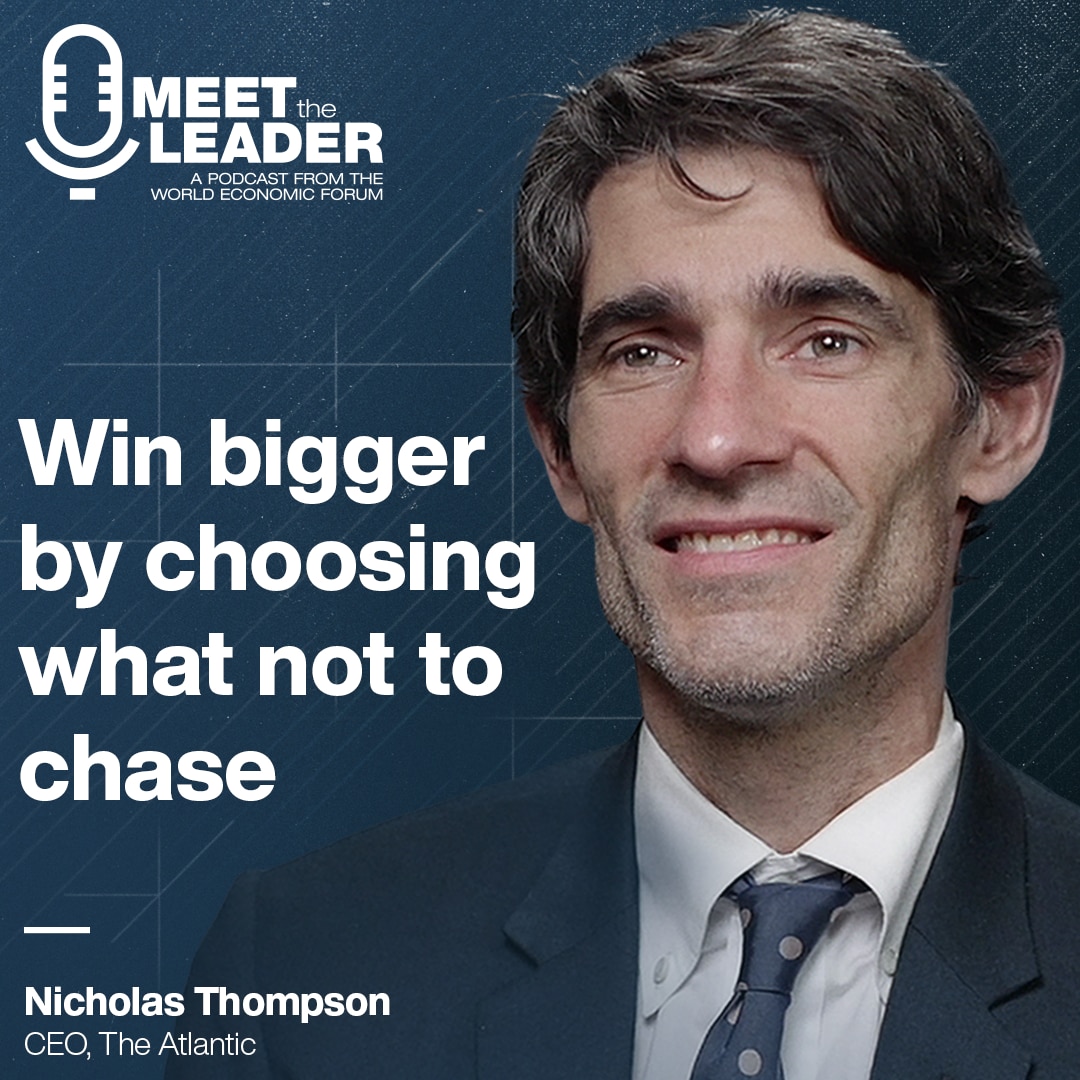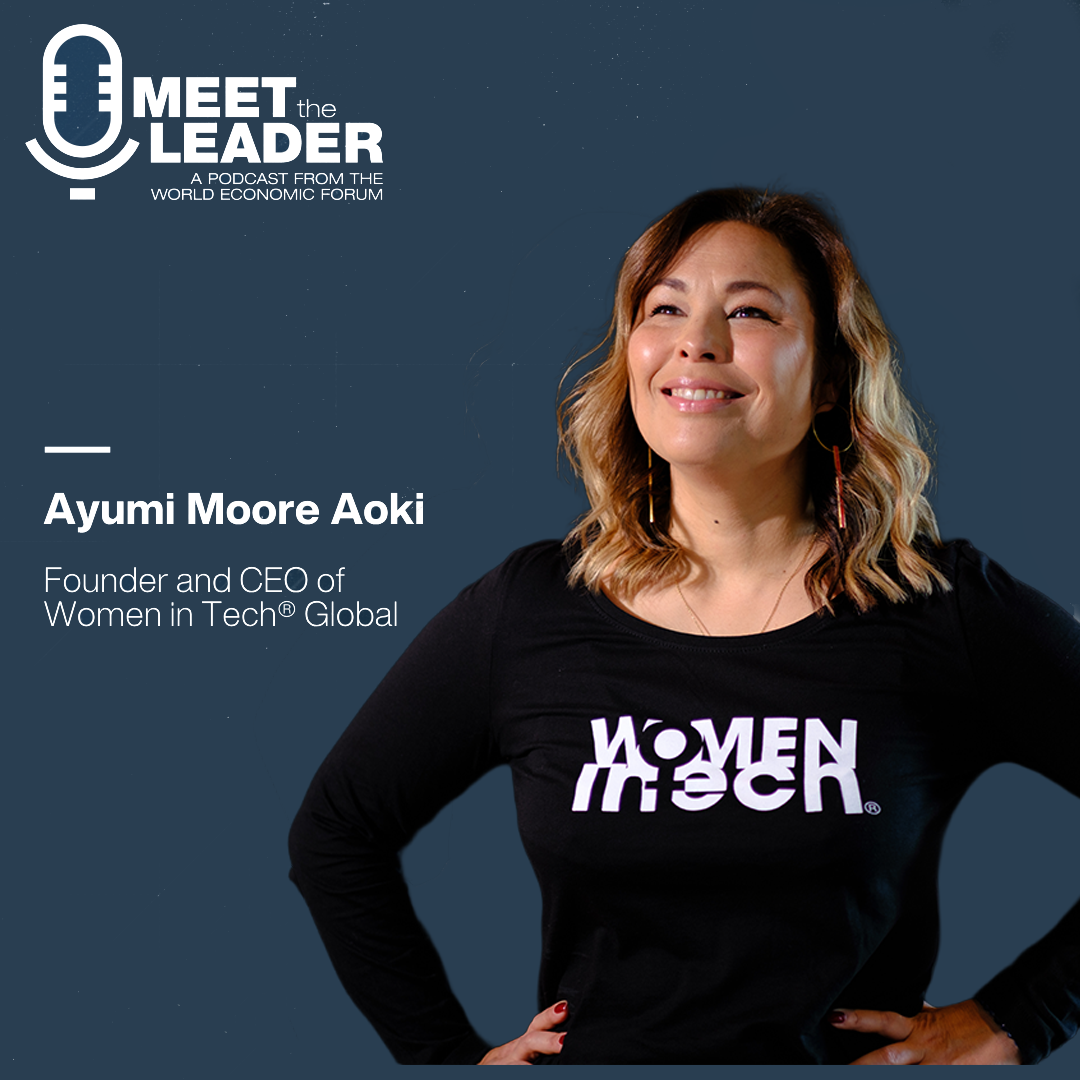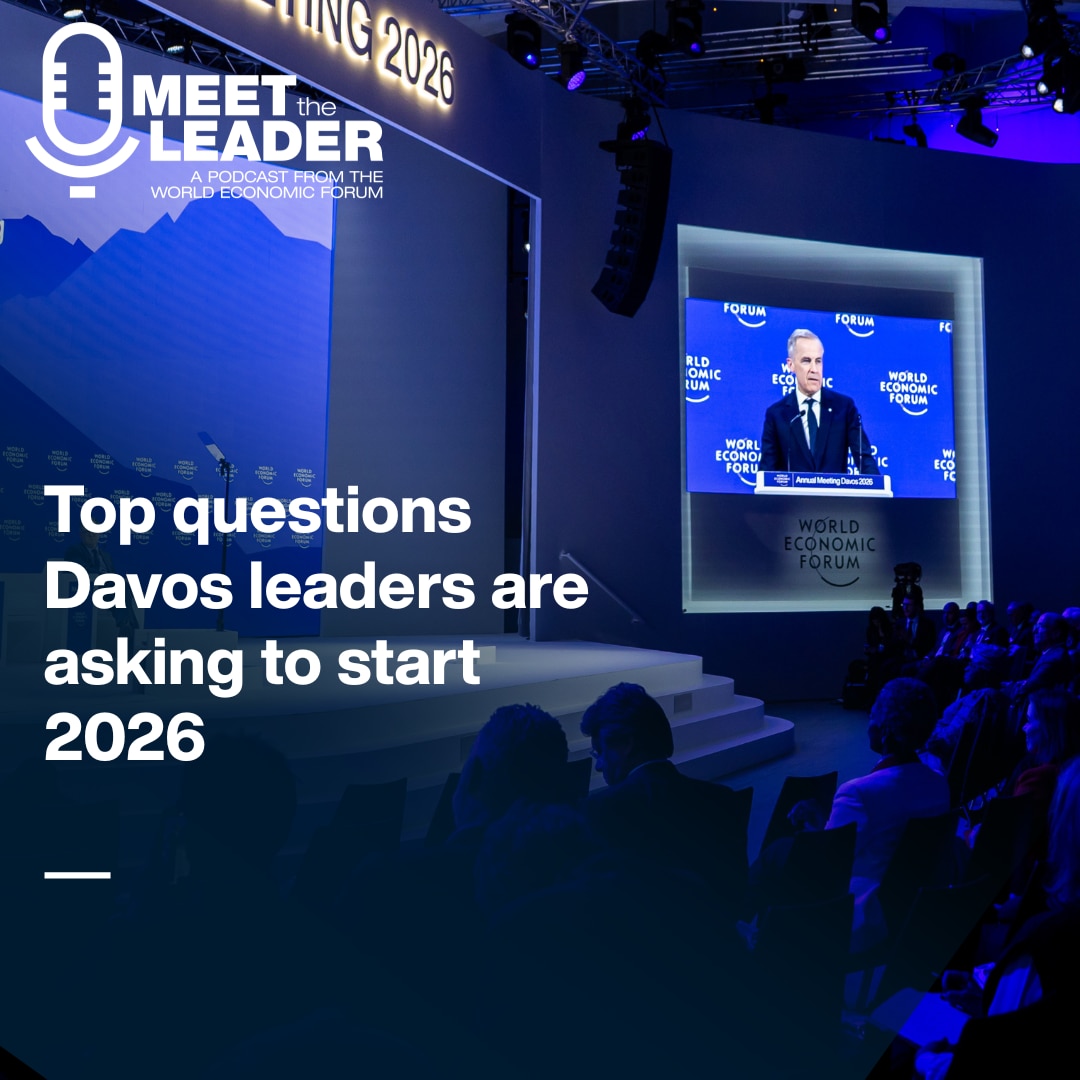IKEA HR chief shares decades of career lessons learned and what’s needed to bridge the gender equity gap
ポッドキャスト・トランスクリプト
Meet The Leader, Linda Lacina Welcome to Meet the Leader, the podcast where top leaders share how they're tackling the world's toughest challenges. In today's episode, we talked to Ulrika Biesèrt. She is the HR chief for retail giant Ikea. She'll talk about how the company is shoring up gender equality in leadership, and the advice that changed how she gets her voice heard.
Subscribe to Meet the Leader on Apple, Spotify and wherever you get your favorite podcasts. And don't forget to rate and review us. I'm Linda Lacina from the World Economic Forum and this is Meet the Leader.
Ulrika Biesèrt, Inkga Group / IKEA Take the space. If you don't take the space, someone else will take it. And don't allow that.
Meet The Leader, Linda Lacina When it comes to women in leadership, there's a drop to the top. That's how the experts behind our 2024 Global Gender Gap report described the shrinking number of women in leadership positions all around the world.
While women represent half of all entry level positions, they make up a third of senior leadership jobs and just one quarter of the spots in the C-suite. Bridging that gap means fixing the pipeline all the way through. And it's not just a nice thing to do. Our researchers found that women's representation at work is a key element of economic resilience.
Plenty of companies, of course, are focused on this issue. But Ingka Group, the parent company of big retailer IKEA, is a step ahead. Last year, it reached near gender balance in leadership. So approximately half of the leaders across top management in 31 countries are female and 45% of Ingka Group countries CEOs are now women.
This is not a shift that happened overnight. In fact, it's a change that took nearly two decades. It was a priority set in 2002 but the biggest change that happened happened in 2013, after a special meeting kicked off a full transformation.
Ulrika Biesèrt will talk about that meeting and what came after. She's the global people and culture manager at Ingka Group, and she shared with me some of the methods and frameworks that helped this 80-year-old company with more than 160,000 employees make big change happen.
She also talked about her own leadership journey. She has been at IKEA for 27 years. She shared with me how she gets her voice heard and the advice that her mother shared that helped her take up more space in any meeting that she's in. She'll talk about all of that. But first, she'll talk more about IKEA and bridging the gender gap.
Ulrika Biesèrt, Inkga Group / IKEA So this is some 20 years ago, and it was the executive management that decided that specifically, if you take IKEA's mission to create a better life for the many people. And the many people are both men or women. They also talked about fairness, but also about having a better recruitment base. When you recruit from the totality and not only specific groups. So we collected the top leaders of the company and you could call it a shocking awareness session. So we had leaders around the world and educators around the world that really, I would say, shake the system on how the reality looked like.
At that time, there were few women in leadership positions. It was, as it is many times, quite biased. The most common I heard at that time was that, "yeah, it's good with women, but we need to recruit on competence." That was the most well known I've heard, and I can still hear that not so much in our organization, but I can hear it when I'm in other forums that still have biases in relation to gender.
Then that was a kickoff with, I would say, quite systematic work on how to change this. So we were setting very clear goals. It started to be measured in many awareness sessions and also really linked to our business performance but also to our culture and values.
And it's not a totally easy change, and it has taken a long time to make this change. Today, if I'm looking at our succession pipeline, I'm actually starting to get worried that we have more women now that are prepared for the next position than men. So that is one of the challenges now. And then, of course, now we are talking about equality in only one perspective when we're talking about gender and gender balance, where we do have 50/50 and that goes throughout organization. Then what I think is super encouraging is that 84% of our workers, we do on a regular basis, service how we sit to be a worker. And 84% of our coworkers say that they can be themselves working at the Ingka, which I think it's an absolutely astonishing result and something that we need to continue to focus on. Because when you can be yourself, when you don't need to play a role. Your connection is focusing on the right thing and you become a more happy coworker, but also a more fulfilled worker. So we have work with gender, but we also work with inclusion as I just talked about.
When you can be yourself, when you don't need to play a role. Your connection is focusing on the right thing and you become a more happy coworker, but also a more fulfilled worker.
”
And then we are not perfect, so we still need to continue to focus. Now we have a strong focus on ethnicity. We want to reflect the markets where we are operating and the communities where we are and where we need to do a similar journey. I would say we are not reflecting solely in our specific management teams. We are not reflecting where we are actually operating.
Meet The Leader, Linda Lacina When we look at those goals that were put into place, what were they? So if other people are listening to this and they think, hey, what should I be tracking? What should I be kind of measuring so that we can kind of start getting a little roadmap together? What are some of those things people should be keeping in mind to start measuring?
Ulrika Biesèrt, Inkga Group / IKEA Firstly, it is to make sure and can actually then work with accountability and performance updates. So I don't know exactly, but I know that in some areas of the company we had very, very few females. So depending on where they were, we said directly that the overall long-term ambition is 50/50 and no compromise on this. And then that was broken down depending on where you were. So you could feel that you are progressing.
And what I saw typically that might be interesting for the ones listening that in my experience -- at least the first decades, but sometimes I can still feel it -- is that if you lose focus, it goes back. So to me, that gives me the information that this is a systemic problem, meaning a societal problem. And it's not on an individual level. It's systemically in the company in this case.
So one thing is the measurement. Be clear. Be communicating your goals. And as a leader follow them up and actually act on deviations. At times you need to focus on specific areas. First we had this big leadership seminar that we talked about. And that was followed up at the half year with the same set up to see what have all of us started to do. We are testing. We are trying what are the potential hinders that we need to take away, etc., etc.
But then we introduced something that was called Ikea International Women's Network, where we invited women to discuss barriers. But the fun part was that we had many men who knocked on the door and wanted to join. So it became not only female, it also became men. And for instance, our customer fulfillment manager was there and he was typically only having men in his field. And he said, I'm super committed and I want to make a change, but what do I need to do differently?
I think also to allow a culture where you don't have the answer, where you can talk about not being perfect, where you can talk about existing results without feeling punished, or that you're doing a bad [job]. So if you have that kind of willingness to discuss, but also willingness to look at yourself and your biases, and I'm thinking of that now when we are looking at ethnicity, all of us are having different biases and we need to understand them to change, right?
So I think back to your question, I would say that be concrete, that to set goals, quite extensively training, but also it starts from the top. So if you don't have your CEO, your CFO, in this case, your people -- human resource manager -- and the rest, digital manager, I think it would be difficult. So the commitment starts at the top.
Meet The Leader, Linda Lacina What are the blind spots that can come up that people may not even realize that they have? Maybe blocking an opportunity to somebody. What are maybe a couple top ones that we can highlight?
Ulrika Biesèrt, Inkga Group / IKEA I need to recall a little bit how it was when we started, and it was many people, leaders, who felt threatened. So if we are now going to give space to many positions for women, what about my future? I think that was the one who dared to express that, and that is important to express because you can deal with everything you talked about. But it's very hard if you don't talk about the fear, "Is my career over?"
And then later on, the result. Since we have been growing all the time, that has not been a problem because we have had the opposite problem, in many years, that we have a shortage actually of talents.
So that was one. And then I think another challenge is what you don't understand. So your unconscious incompetence in some areas that you might think that you are open, you might think that you are not biased, but still you are. So for instance, when you are recruiting, it's very easy that you appreciate and you recognize certain strengths and behaviors that you're holding yourself. And therefore you might recruit people that both on a deep level, but also on a capability level in a behavior that are very similar to yourself that is opposite to diversity and equality and inclusion. So that could be another one to really litle bit scrutinize yourself.
And for instance, if you want to be concrete, look at your last ten recruitments. How had they been? What do you define as strengths and what do you define maybe as challenges and to see where are you in that? That could be two concrete examples because what we discovered also based on nothing new, but also that on a more diverse team where you have different backgrounds, different ethnicities, ages, you actually create a better business because you look upon it in a different way.
We saw that if we could have representatives from all parts of the world when we are developing a certain product, we were more relevant for the customers.
”I worked, for instance, a long time ago, where we are doing our product development. That is a very creative organization, and we saw that if we could have representatives from all parts of the world when we are developing a certain product, we were more relevant for the customers. Which is kind of logical but has only been wild made in the '40s, for instance, the product would have looked differently. Then you recruit someone who is from China, someone from India, maybe someone from North America, etc. This is just one example, but I think it's a speaking example of how to utilize diversity to actually run a better business.
Meet The Leader, Linda Lacina I want to talk a little bit about retention. IKEA has done something that a lot of companies are also struggling to do, which is retain folks in retail. Can you tell us what that looks like for Ikea? What are you guys seeing? What is that retention rate?
Ulrika Biesèrt, Inkga Group / IKEA So we have been exposed to that like all retail and many others as well where we have seen very high turnover. And we actually don't even talk about staff turnover, we always talk about staff retention. We want our coworkers to stay. So what we did was a very thorough analysis: Why do people leave us? Because we want people to stay. And we started to work very intentionally. And we came up with five things after interviews with many, many, many coworkers.
The first reason is around what we call fair income. And it's not only about the salary, it's the total offer. For instance, health insurance, pension, parental leave, the totality of the conversation and benefits. So that has been one factor where we decided that we want to be fair and we want to have fair income that is reflecting that specific market, but also what is the total offer. So we have the performance bonus, but we also have an extra contribution to your pension depending on what markets you're in. In some markets, we've been providing day care. So you know that totality is very important. So that was one.
The second one is around flexibility. So more and more coworkers -- and I'm talking specifically about frontline coworkers, now -- want to choose when to work and how much to work. And we have been quite traditional. We [had been] offering you a number of hours. And then we as a company are deciding this is when you can work. So we are turning that around now with something we call "Assemble your Job," where we were given much more empowerment and autonomy to the coworkers to decide by really driving also technology as a support for us. So that is one area where we are driving pilots also to see how can that support.
Then we have the competence development in leadership. So we see a correlation also if I really appreciate my leader, it's kind of a no brainer, I also have a higher tendency of staying. So we have invested very much in leadership and leadership training. Also reskilling and upskilling.
And then we know that for our coworkers top reasons why people want to stay in IKEA, it's equality. It's one. So our coworkers get a lot of energy from that. We are a purpose-led organization that combines purpose and profit. We're very vocal around that. And in that also is the totality of our culture and values. So the culture, value system are – I would say – the number one reasons why people choose us. But also why they choose to stay.
So what we did was to use all what I've said about the fair income and total rewards, the flexibility in how to work and how much to work, to have the right tools so I can perform my job, and leadership competence development. That is kind of the equation. And then we have done top down. So this is what we want to see everywhere. We have done bottom up. So we have asked the markets to help us. And then we are running two pilots where we're going little bit wild and crazy to test new things. And we are actually quite dramatically lowering our staff retention. The goal is actually at 17, we are 16.7 now and the goal is 17 this year. And that end goal is 15 to be a realistic goal. So 15% because we are very tight. We are also offering short-term assignments and so on. So we need to be realistic in their working groups. 15% we have said would probably be very good for us.
Meet The Leader, Linda Lacina And how does that compare to like the typical average for retail in this climate right now?
Ulrika Biesèrt, Inkga Group / IKEA I mean, you have now retailers that have 70-80% staff turnover, meaning that you just start and then you leave. I think the average on the market, I can't promise this, but I think it's around 45-50%. And we are then closed out at 15 and now I'm talking about the many coworkers in the front line.
Meet The Leader, Linda Lacina And you mentioned those competency trainings for leaders to help them lock into the things that really help people stay. What are those traits? If I'm listening to this and I'm like, I want this, I want to unlock the magic. What are those top traits or things that they can do for their teams that help teams stay?
Ulrika Biesèrt, Inkga Group / IKEA People are looking for companies that are standing for something and that is standing for something bigger. And that is what I'm talking about: Purpose. It's a living reality. It's something -- we are celebrating 80 years this year as a company. And this is something that was taught from when the company started. Very intentional. Very human-centristic approach. And it's not anything fluff. And it might sound like everyone talks about this. I actually really think that the way we are working with, executing and leading our culture and values is one of the absolute, if not the real core thing, why we have been so successful. 84% of our coworkers rate that they feel they can be themselves. 81% feel included and 79% -- close to 80% -- are feeling engagement. And if I compare that to many others, we are having very, very high figures. So people like us, that doesn't mean that we are perfect.
But if I'm going to answer your question, culture and values are living culture values. And for us that is about being systematic in how we work. So to be concrete, the first thing we are doing is that we are very clear that IKEA is not for everyone, meaning we recruit on values, we don't recruit on CVs. So if you come to us for a recruitment process, we are very interested in you. Who are you and what makes you happy? What is your attitude? What do you want to do in life? And we really love to have straightforward doers who like to grow. So that is the number one.
Then we continue through trainings with what this culture values. What does it mean? We have something we call -- and that maybe is my second example -- is something we call Leadership by All. So within our company everyone is a leader and we have set then behaviors and expectations that goes for everyone. So if I'm the CEO or if I'm a frontline coworker, we have the same seven expectations.
And then I can give another example that when we are measuring performance, we are measuring what you do. Your business performance with clear goals. It's 50%, but 50% is how you are doing in your business and how you collaborate with others. We are a company where togetherness is absolutely the key, meaning one person can't do everything. So we are more a "we" company than a "me" company and we believe that one plus one is equal three. So how you perform is as equal as your real business performance.
If I should describe it in an easy way, let's say that I am a business leader. I outperform in the business. I have the highest rating in all my business goals. But the way I'm living, the culture and values are not really the way we as a company want to be -- how we treat coworkers -- then we're not performing. And of course we can give you a chance and we can train. But at some point, if that doesn't change, there is not a culture fit. So even if you perform well and vice-versa, so that you are truly leading the values, but you might have different reasons you're struggling with your business performance for a while. We will give you another chance because we believe in the culture and values. And I think that what I'm trying to describe is that the culture and values as a living reality. And I think maybe that is the most important test that you act and that we are very clear. Who are you and what do you want to stand for as a company?
Meet The Leader, Linda Lacina We were just talking about retention, and all industries are going to be facing labor shortages in the years to come for a variety of reasons, including demographic. There's just going to be population shortages. What is IKEA preparing for and how, like looking in the future, what do you guys think might impact you and what are you putting in place?
Ulrika Biesèrt, Inkga Group / IKEA I know that we don't have a 10- to 15-year plan, but what we do know is that we know where the business is heading. We have a very clear people strategy that is tackling -- so we have decided that we want people to thrive, we want people to develop and we want people to feel respected and included. In all those, we have very strong initiatives and actions. So if I simplify it, the preparation is that we really want to be a workplace where people's needs are met.
We know that we need equality to attract but also retain (and equality in the biggest sense -- Equality, diversity, inclusion) is super important for people. So I think to handle talent shortage, you need to start to think differently in how you're sourcing, recruiting people. I still think that many companies and many retailers, we are looking at the same recruitment base and then we compete on people.
So let me give you one example in this area. We did and decided some years ago that we will support refugees. So we have already supported 2,500 refugees by offering job training and language training and a big, big portion, I think, we have 95% have been recruited also. So, today, yeah, those people are super happy working for us and now we have committed to 3,000. That is another way -- also we did it for social responsibility. That was our driving force. But if you think from a sourcing strategy, you have an untapped potential in groups of people that have difficulty entering the job market but are super talented. And then it's around competence development where we see and learning, we call it democratic learning and we call it that very intentionally, because competence development is for everyone and not only their critical few. And what we see on the talent shortage in that field is today we have many coworkers that might work in one area. If I take a store as one example -- it's easier -- you might work in children's IKEA, in the kitchen, in the marketplace, and in the restaurant. But normally you work only in one place. But we believe in the future is that we need also more flexibility as a business. So you might work in several of those areas, and that is also one way to create more business flexibility, but also more flexibility for those coworkers who want to work more, for instance, than part time.
What I'm trying to say is that you need firstly to have a good company that is attracting the right people, and those people stay. Then of course, when we're looking at what is happening now, we have an AI revolution going on in the world where we also, as a company, are looking into where and how to optimize with speed.
What we have discovered so far is that we don't need less people. We actually have the same amount and even more people because we are growing. But they might need other skills and competencies. And there is probably where we are. So we are looking at new work models, we are looking at increasing the flexibility and most of all, we are trying to hear much more the need and wants from the coworkers so we can be as good an employer as possible, and by that, attracting people.
And then you need to be more creative. Where do you find your people and maybe also in your recruitment strategy? And that is something that we have done since this company started. You might not have exactly the right CV, and in many positions, not in all, but in many positions. You can learn and you can reskill and upskill, and thereby you can have people that might. We have so many examples that you might have started in one area and then you're working a total other area. So we have that legacy of cross-border, cross0function.
But some of it I don't know myself yet how we will tackle. But this is how we're doing it. We're doing it organically. We're doing it by really focusing on being the best employer possible, by being more creative in how to recruit. But also look at the work models for the future.
Meet The Leader, Linda Lacina You have been with Ikea for nearly 30 years. That also played out with you as well, where you were maybe in different departments. How is that sort of evolved throughout your career at IKEA?
Ulrika Biesèrt, Inkga Group / IKEA I think I'm a good example. So, you know, I started at IKEA, I had a career for six years as a family counselor and social worker and I actually loved that work and specifically working with people. But I felt that organization was too slow for me. So I went back to university, I took a new, or additional education. And then actually a bit by coincidence, I found IKEA. And actually the first day I came, I thought this would be exciting and I would stay a couple of years and then I will continue. Like you think many times I think when you start, but I kind of fall in love directly. And it was the culture. I really, really liked people. That was the attitude. Test and try. don't ask for too much permission. Continue to develop and so on.
So I started in distribution, where you have more hands-on working environment questions and many, many blue collar workers. And then quite quickly, I started on as a generalist. I was promoted to become the HR manager. I was very young at that time, to become an HR manager for quite a big site like North Europe. And then I was formulating and this is actually how it was. I was pregnant with our second child and to my bosses said I think an international experience would be good for me. And it literally happened very fast. So we moved to Switzerland where I was put on assignment, where I didn't have the competence actually. So I work on global projects for a couple of years. And then from that I was going to IKEA's supply-chain working and purchasing and logistics. It's very different again. Then I moved again and I worked in IKEA's product development. Then later I worked in people and culture globally for IKEA, working with their talent questions, with succession leadership and competence development. And there is a big difference from being in an operations, going to a global staff function.
And then it has continued. And I was leading parts of our retail organization, and then seven years ago, I was asked if I was interested to move to the Netherlands, where I'm living now, and this is nearly 8 years ago. And then the idea was that I would take this role, but wisely enough, they said it's good if you move 8-12 months beforehand so you can learn. And then you can land also your youngest son. And then I took over, so I moved here knowing that I should take over the position.
I've actually done all parts of the company. All core parts with logistics, with purchasing, with retail, with product development, in group functions. So I think I'm a good example from that perspective. And I'm not unique -- at all. And so now I described that I have done university twice, but we have also many coworkers that don't have that kind of experience with them that have sailed on with the company and that is the right attitude. And you need to have a little bit of courage to do what I've done, also to move abroad and so on. But the payoff is enormous.
Meet The Leader, Linda Lacina How have you changed as a leader in those near 30 years? Is there something that you do now, way that you solve a particular type of hiccup, or a way that you approach things in general that just would not have occurred to you at the beginning of your career, because why would it have?
Ulrika Biesèrt, Inkga Group / IKEA If I'm looking at how I have evolved, I think first, when I saw that I was more a manager, meaning more direct, the more clear, more follow up. And then when you evolve, you start to get projects where you need to be part of transforming the company you're working with change which requires another set of skills and is more complex, if you like. And then I think that the third step is probably about not changing, but shaping the culture. So I think in my leadership, since it's so broad, since in so many markets, it's about shaping a culture and the culture you want to have. And it's of course IKEA culture, but also different times require [something] a little bit different. All of us as leaders and coworkers. And then I would say now, which is an old expression, but I feel much more wise and grounded in my assignment. I feel quite safe that, you know, I feel quite that I have a deep knowledge. I can rely on myself more, actually. So from that perspective, at least, what I'm striving for and I'll try always succeed, is to be much more serving my organization, meaning that how can I really enable the organization and our people to do the best possible job for the company?
And that is another mindset. In the beginning, I think it's more about you and how you are as a manager. And today maybe my ego is less big. I'm more -- this you should ask my coworkers -- I'm trying to be more calm and relaxed. And I'm thinking of how can I make them succeed? And I can be a little bit more in the background. And that it's more about serving others than being seen yourself. So I think I, at least historically, had a big need of being seen. I say what I have done, which is natural, and specifically when you're not known, you need to expose yourself. But now I feel differently in that sense.
Meet The Leader, Linda Lacina There's a generation of young people that are going to be graduating from school, and the careers that they're going to have are going to be different than any that we will have, because the pace of tech is going to change at even faster, faster cycles. And also they're going to live longer. And the way that they're going to be approaching everything from retirement to work and part-time things is going to be different. Anyway. What is your advice for these new grads in this very first phase? What should they be -- how can they make sure that they absolutely do in this first job in their as they kind of approach their first parts of their career.
Ulrika Biesèrt, Inkga Group / IKEA The first that comes to my mind, but I think is to think values, to have curiosity, an open mindset, be prepared to learn. And unlearn. And I think that will be the biggest change with this generation is that they are constantly unlearning will be learning, upskilling. And so you need that curiosity and a learning mindset.
Be prepared to learn. And unlearn. You need that curiosity and a learning mindset.
”
But for me, that might be a little bit too technical. If I'm looking at, you know, if I'm paranoid as to what is happening in the world and work and see things like mental health we see that is really decreasing everywhere in a negative way. I think the most important (for not only young people, but the question was for young people) is to get to know yourself. Who are you for real? And trying to be yourself at the greatest extent, because directly when you start to play your role, your energy is leaking. So that is one piece of advice. That advice would be if you can be very intentional what company you choose to work for. And in that, it becomes lead yourself. But you can't lead yourself in my experience if you don't know yourself.
So I would say specifically because we talk so much about resilience now, so much about agility, so much on constant changes, if I'm taking the broader perspective. Also with social media, with the pressure to always have something to compare to. I think the pressure, and you have the climate -- and I can continue. There's quite a lot of pressure on young people today. Also about the future and how the future will look like. I think to build up yourself, to feel good about yourself, to build strengths within yourselves, to find your values and how you can navigate yourself is the biggest gift you can give yourself. And then you will also take -- I believe -- better decisions, because you will take decisions based on what you want, what you need, not what others want from you.
To build up yourself, to feel good about yourself, to build strengths within yourselves, to find your values and how you can navigate yourself is the biggest gift you can give yourself.
”Meet The Leader, Linda Lacina Is there just a piece of advice that you've always been grateful for, that you've always taken forward?
Ulrika Biesèrt, Inkga Group / IKEA I'm always talking about my mother. Unfortunately, she is not with us anymore, but she was a very strong woman and very vocal. And she said to all her four children that you need to be financially independent. And my advice to you is that you educate yourself. You never know what is happening in life, but knowledge people can't take away from you and education will most likely help you to have a job. So that was one.
And the other one where I think she was probably ahead of her time, specifically to her three daughters. She said, take the space. If you don't take the space, someone else will take it and don't allow that. And it actually helped me, to be honest, in, you know, in management meetings, in the beginning of my career, I always have been the only female, and I always had that in my head, like, take your space and don't excuse yourself for taking some space.
Take the space. If you don't take the space, someone else will take it and don't allow that.
”Meet The Leader, Linda Lacina Before that was all recaptured. Thanks so much to her, and thanks so much to you for listening to read our Global Gender Gap Report. Go to the show notes of this episode. We'll make sure to have a link
And to find a transcript of this episode, as well as transcripts from my colleague's podcast Radio Davos, go to wef.ch/podcasts.
This episode of Meet the Leader was produced and presented by me, with Jere Johannson and Taz Kelleher as editor and Gareth Nolan driving studio production.
That's it for now. I'm Linda Lacina from the World Economic Forum. Have a great day.
Last year, Ingka Group, the parent company for big retailer IKEA, reached near gender balance in leadership. This transformation did not come overnight and HR chief Ulrika Biesèrt discusses the mindset shifts and tangible changes in everything from hiring to development that helped make this possible for the 80-year-old company. Biesèrt also shares her own leadership journey, one that includes 27 years at IKEA and roles in every part of the company, including logistics, product development and retail. She explains how that breadth and depth shapes how she leads -- while also sharing the advice her mother gave her at the beginning of her career that has helped her get her voice heard.
トピック:
リーダーシップその他のエピソード:
「フォーラム・ストーリー」ニュースレター ウィークリー
世界の課題を読み解くインサイトと分析を、毎週配信。














